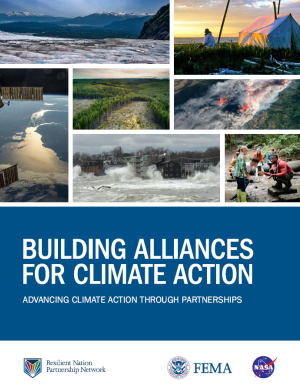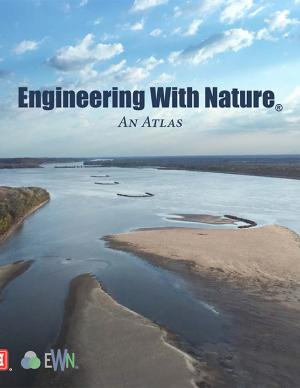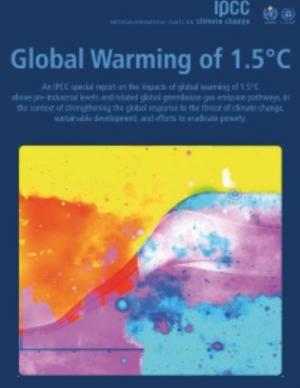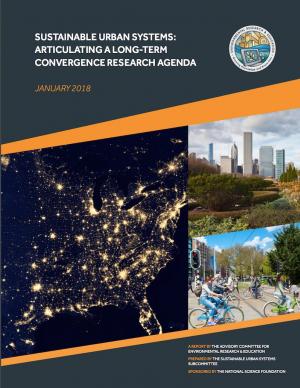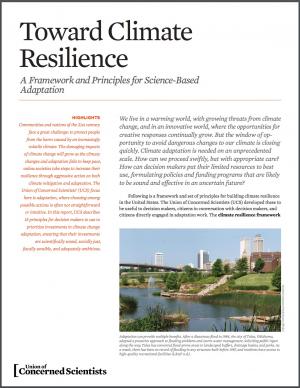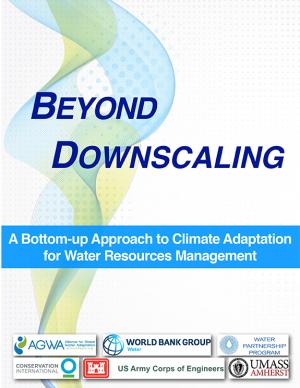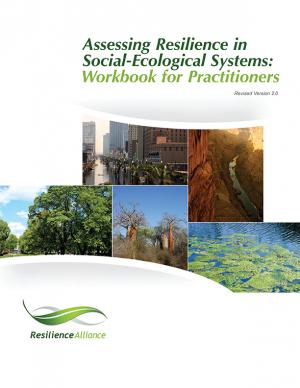Access a range of climate-related reports issued by government agencies and scientific organizations. Browse the reports listed below, or filter by scope, content, or focus in the boxes above. To expand your results, click the Clear Filters link.
To become climate resilient requires collective action. Our efforts must take a Whole-of-Government and Whole Community approach.
The Resilient Nation Partnership Network is working to address this through partnership. The result of our collective action is this Building Alliances for Climate Action resource. It is the work of many organizations and individuals, including federal representatives, faith leaders, community-based organizations, mayors and many more. At a time when many are searching for direction on how to address the climate crisis, this resource represents a unifying voice, helping guide the Whole Community forward
The Working Group II contribution to the IPCC Sixth Assessment Report assesses the impacts of climate change, looking at ecosystems, biodiversity, and human communities at global and regional levels. It also reviews vulnerabilities and the capacities and limits of the natural world and human societies to adapt to climate change.
The world continues to emit greenhouse gases while the planet's climate is changing faster than ever. This report intends to take up the latest and most essential scientific findings published in an extraordinary year—the climate science year in review.
This report focuses on making the case for climate adaptation, providing specific insights and recommendations in key sectors: food security, the natural environment, water, cities and urban areas, infrastructure, disaster risk management, and finance. It is designed to inspire action among decision makers, including heads of state and government officials, mayors, business executives, investors, and community leaders.
The EWN Atlas is a collection of 56 projects illustrating a diverse portfolio of contexts, motivations, and successful outcomes, presented and considered from an Engineering With Nature® perspective to reveal the usefulness of nature-based approaches and the range of benefits that can be achieved. Engineering With Nature is an initiative of the U.S. Army Corps of Engineers enabling more sustainable delivery of economic, social, and environmental benefits associated with water resources infrastructure. EWN intentionally aligns natural and engineering processes to efficiently and sustainably deliver economic, environmental, and social benefits through collaborative processes.
This special report from the Intergovernmental Panel on Climate change describes the impacts of global warming of 1.5 °C above pre-industrial levels. The report also describes potential global greenhouse gas emission pathways, in the context of strengthening the global response to the threat of climate change, sustainable development, and efforts to eradicate poverty.
In 1950, fewer than one-third of the world's people lived in cities. Today more than half do. By 2050, urban areas will be home to some two-thirds of Earth's human population. This scale and pace of urbanization has never been seen in human history.
The report provides a foundation for new scientific collaborations on how cities function, how they grow, and how they can be managed sustainably for decades to come.
Communities and nations of the 21st century face a great challenge: to protect people from the harm caused by an increasingly volatile climate. The damaging impacts of climate change will grow as the climate changes and adaptation fails to keep pace, unless societies take steps to increase their resilience through aggressive action on both climate mitigation and adaptation.
This report focuses on adaptation, where choosing among possible actions is often not straightforward or intuitive, and highlights 15 principles for decision makers to use to prioritize investments in climate change adaptation.
Climate change adds uncertainty to already complex global water challenges. Though no standard method has been adopted yet by the World Bank, common practice uses downscaled precipitation and temperature projections from Global Climate Models (GCMs) as input to hydrologic models. While this has been useful in some applications, they often give too wide a dispersion of readings to provide useful guidance for site-specific water resources management and infrastructure planning and design. Rather than design for an uncertain situation selected a priori, the so-called “bottom-up” approaches explore the sensitivity of a chosen project to the effects of uncertainties caused by climate change. Supported by the Water Partnership Program, this book summarizes alternatives explored by a group of organizations that belong to the Alliance for Global Water Adaptation (AGWA), to provide practitioners with the tools to adapt to the realities of climate change by following a decision-making process that incorporates bottom-up thinking.
This Synthesis Report summarizes the Fifth Assessment Report (AR5) of the Intergovernmental Panel on Climate Change (IPCC). This report distills, synthesizes, and integrates the key findings of the three IPCC Working Group contributions—The Physical Science Basis; Impacts, Adaptation, and Vulnerability; and Mitigation of Climate Change—to the AR5 for the benefit of decision makers in government, the private sector, and the general public. The report also includes findings from two Special Reports released in 2011: Renewable Energy Sources and Climate Change Mitigation and Managing the Risks of Extreme Events and Disasters to Advance Climate Change Adaptation. The Synthesis Report confirms that climate change caused by human activities is having impacts on ecosystems and human well-being across the U.S. and around the world.
The Intergovernmental Panel on Climate Change (IPCC) Working Group II's contribution to the Fifth Assessment Report (AR5) relates to climate impacts, adaptation, and vulnerability. A Summary for Policymakers and the underlying scientific and technical assessment are also available.
The workbook for practitioners uses strategic questions and activities to assess resilience in social-ecological systems. The approach involves constructing a conceptual model of a system that includes resources, stakeholders, and institutions, and identifies potential thresholds between alternative systems states in order to provide insight into factors that build or erode a system's resilience. A resilience assessment can help with developing strategies for coping with uncertainty and change.

